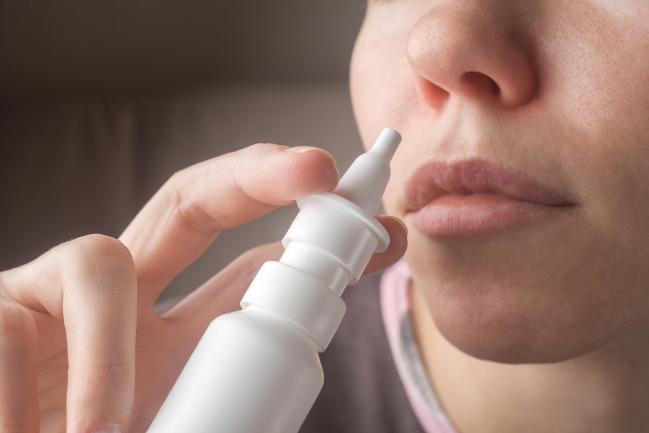Etripamil Continues to Show Promise in Paroxysmal SVT: NODE-302
Results from the open-label extension study show a consistent response among patients with recurrent episodes.

Etripamil nasal spray (Milestone Pharmaceuticals) continues to show promise as a way for patients to treat their own paroxysmal supraventricular tachycardia (PSVT) without the need for an emergency department visit or further intervention, data from the NODE-302 open-label extension study suggest.
The therapy also appears to work consistently for people with recurrent episodes. Fully half of those who used it to address two PVST episodes saw their heart rate return to normal both times.
“This is a very helpful drug because when patients have SVT, if they can’t stop their arrhythmia by doing a Valsalva maneuver, or vagal maneuver, then the only option is to go to an emergency room or call an ambulance,” so that they can receive IV adenosine, James E. Ip, MD (NewYork-Presbyterian/Weill Cornell Medical Center, New York, NY), lead author of the new paper, told TCTMD.
Two properties make etripamil suitable for PVST, Ip said. “It has rapid onset, so it works within minutes. . . . It also has a redesigned molecule so that it is metabolized by the body quickly, so it doesn’t stick around for a very long time.” Before the nasal spray, the other option for self-treatment was the “pill-in-the-pocket,” where patients take an oral remedy to PVST, he explained. But with a pill, the medication is slower to exit the body and can cause side effects.
The new findings follow, most recently, those of the randomized RAPID trial, first presented in full at the 2022 American Heart Association (AHA) meeting and published this summer in the Lancet, showing etripamil nasal spray for patients with PSVT is safe and effective.
Prior to this came NODE-301, a phase III randomized trial whose results were released at AHA 2021. That study tested etripamil 70-mg nasal spray in patients with PVST whose symptoms continued despite doing a vagal maneuver. It found the medication to be safe but failed to show a significant advantage for the spray versus placebo for its primary endpoint: termination of ECG-verified PSVT within 5 hours of treatment.
However, Ip pointed out, there did appear to be some benefit with the spray. For example, 54% of the etripamil group saw their PSVT end within 30 minutes, as compared with 35% of the placebo group.
After NODE-301 was complete, its participants had the option of continuing in NODE-302. The paper published today, in the Journal of the American Heart Association, focuses its attention on that 30-minute window.
NODE-302
A total of 169 patients took part in NODE-302, of whom 105 self-administered the nasal spray at least once for perceived (but unverified) PSVT symptoms over median follow-up period of 232 days. Forty-five of the 105 (42.9%) experienced a treatment-emergent adverse event, though these were “generally transient and mild-to-moderate,” the researchers report. Nasal congestion occurred in 14.3%, nasal discomfort in 14.3%, and rhinorrhea in 12.4%, but none had a serious cardiac safety event within 24 hours of etripamil use.
This is a very helpful drug because when patients have SVT, if they can’t stop their arrhythmia . . . then the only option is to go to an emergency room or call an ambulance. James E. Ip
In all there were 188 verified PSVT episodes for which 92 patients used etripamil: 60.2% saw their heart rate restored to normal within 30 minutes and 75.1% saw it return within an hour. Among these, 16 PSVT episodes required additional intervention beyond the etripamil: 12 were treated with IV adenosine, two with physician-assisted vagal maneuver, and two with oral self-administered rescue medication or pill-in-the-pocket.
The analysis of recurrences included 40 patients who self-treated for two PSVT episodes. Here, 75% had a consistent response to etripamil within 30 minutes—half converted on both episodes, while nine didn’t convert on either.
“Pending studies of a second dose of intranasal etripamil during ongoing PSVT without medical supervision will provide additional safety and efficacy data to assess its potential therapeutic application,” the researchers note.
According to a Milestone Pharmaceuticals press release, the company plans to seek US Food and Drug Administration approval for a PVST indication in October. The product is also being studied in patients with atrial fibrillation with rapid ventricular rate in the ongoing ReVeRA phase II trial, which has completed enrollment and is expected to report top-line data later this year.
Caitlin E. Cox is Executive Editor of TCTMD and Associate Director, Editorial Content at the Cardiovascular Research Foundation. She produces the…
Read Full BioSources
Ip JE, Coutu B, Bennett MT, et al. Etripamil nasal spray for conversion of repeated spontaneous episodes of paroxysmal supraventricular tachycardia during long-term follow-up: results from the NODE-302 study. J Am Heart Assoc. 2023;12:e028227.
Disclosures
- Ip serves on the steering committee for Milestone Pharmaceuticals, which funded this study





Comments